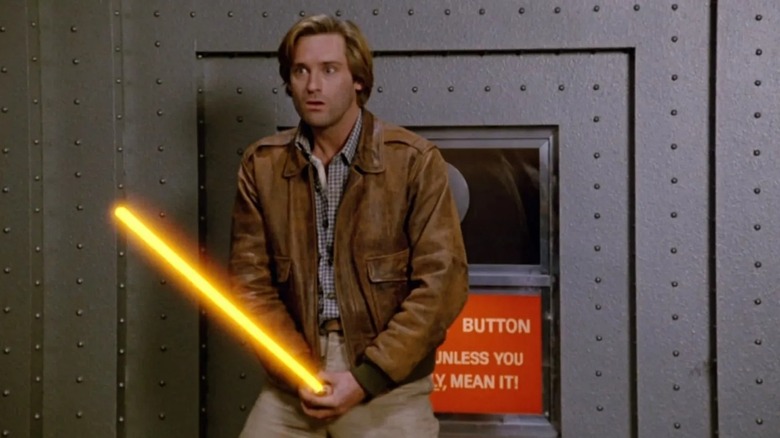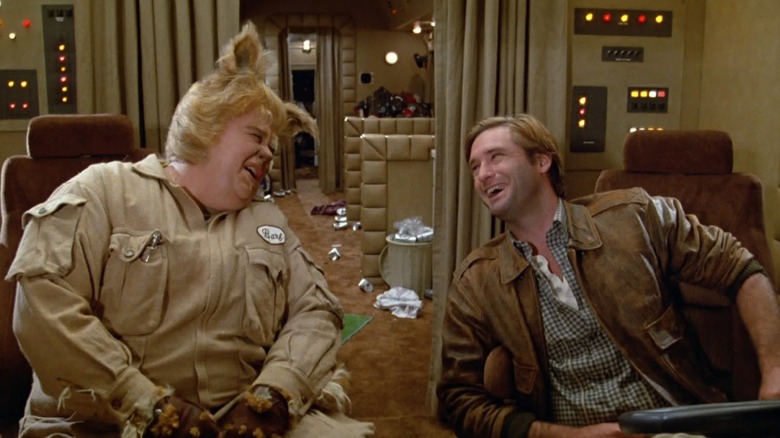Blue Screen Made For Some Awkward Moments Behind The Scenes Of Spaceballs
In a 1987 behind-the-scenes video, "Spaceballs" writer and director Mel Brooks referred to his comedy as an "appreciation of the human event." In that same interview, however, he admits that his humor can also skew toward the disgusting. After all, this was the man who filmed what might be the longest scene of human flatulence in film history. When it came time to satirize "Star Wars," Brooks was equally impish, making a fourth-wall-breaking classic farce full of slapstick ridiculousness and no small amount of blue humor.
"Spaceballs" starred Bill Pullman as a Han Solo-like rogue named Lone Star who is tasked by the benevolent King Roland (Dick Van Patten) with retrieving the runaway Princess Vespa (Daphne Zuniga). The film takes Lone Star, Vespa, the dog-man Barf (John Candy), and the android Dot (Lorene Yarnell, voiced by Joan Rivers) on an adventure fleeing the evil Spaceball empire led by the wicked Dark Helmet (Rick Moranis). Despite the film's unending silliness, Brooks still included a good number of legit sci-fi moments, assuring that his comedy film still took place in a universe with physical rules.
Well, some physical rules. There is a scene wherein the Spaceballs accidentally kidnap the main characters' stunt doubles.
The sci-fi rigors of "Spaceballs" meant a great deal of traditional effects shooting, including numerous scenes of Pullman acting in front of a blue screen. Although he cannot pinpoint why, Pullman revealed in a 2017 interview with The Hollywood Reporter that Brooks and crew required he and his co-stars wear sunglasses between takes to protect their eyes from the blue screens.
Blue screens will make you go blind
There is some proof to back up the belief that constant exposure to blue light can damage your eyes and lead to age-related macular degeneration, but that's based on research related to new digital screens and cell phones. There doesn't seem to be any medical proof that working with blue screens can do immediate damage to one's eyes. Regardless, Brooks seems to have wanted to mitigate any possible risks for his cast while shooting against a blue screen, and everyone was issued sunglasses.
Wearing sunglasses during rehearsals, Pullman revealed, greatly interrupted the actors' preparation. 30 years later, he bemoaned the process, saying:
"They had a belief back in those days that the bluescreen was bad for your eyes. I can't remember if it was Mel or the assistant directors who heard this, but they would call cut and everyone would put on their sunglasses ... It was so hard to work the comedy in between takes when everyone was wearing sunglasses."
Pullman seems to have wanted to keep the mood light and the comedy fresh in between takes, but the application of sunglasses seems to have been anathema to that. Putting on sunglasses can, after all, block off eye contact, or merely alter one's character into the kind of person who would wear shades indoors. This must be especially frustrating if one is playing a king or a regal figure for whom sunglasses would be undignified.
Luckily, the bulk of Pullman's scenes were filmed on real sets with real actors, so it didn't seem to have been a problem for too much of the "Spaceballs" production. One can only imagine the headaches involved if Brooks' method was employed on the all-blue-screen "set" of a modern Marvel movie.

